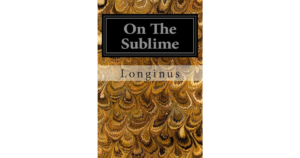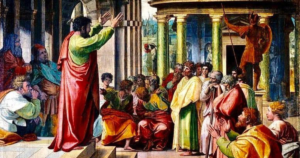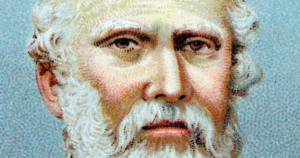Longinus and His Famous On The Sublime
Longinus (1st century AD) was a Greek rhetorician and literary critic, best known for his treatise “On the Sublime” (Greek: Περὶ Ὕψους, Peri Hupsous). This work is a foundational text in the history of literary criticism and aesthetics.
Table of Contents
Longinus’ most famous work is:
- “On the Sublime” (Greek: Περὶ Ὕψους, Peri Hupsous): A treatise on aesthetics and literary criticism, exploring the concept of the sublime and its role in literature.

Other attributed works:
- “On the Composition of Words”: A treatise on rhetoric and style, focusing on the arrangement of words in speech and writing.
- “On the Faults of Speech”: A work on rhetorical errors and how to avoid them.
- “On the Passions”: A treatise on the role of emotions in rhetoric and literature.
Please note that the authorship of these works is not universally accepted, and some scholars attribute them to other ancient writers.
“On the Sublime” remains the most widely accepted and celebrated work of Longinus, and its influence on literary criticism and aesthetics is still significant today.
Contributions to literary criticism:
- Concept of the Sublime: Longinus introduced the concept of the sublime, which refers to the experience of being overwhelmed by the grandeur, beauty, or power of a work of literature.
- Emphasis on emotional response: Longinus argued that literature should evoke strong emotions in the reader, rather than simply conveying information or moral lessons.
- Importance of style and language: He stressed the significance of style and language in creating a sublime experience, highlighting the use of figurative language, imagery, and rhetorical devices.
- Analysis of literary devices: Longinus analyzed various literary devices, such as metaphor, simile, and hyperbole, and demonstrated how they contribute to the sublime effect.
- Focus on the reader’s experience: Longinus shifted the focus from the author’s intentions to the reader’s experience, emphasizing the role of the reader in creating meaning.
- Influence on Western literary criticism: “On the Sublime” has had a profound influence on Western literary criticism, shaping the development of aesthetics, Romanticism, and modern literary theory.
Longinus’ work remains a fundamental text in literary criticism, continuing to inspire scholars and writers to explore the complexities of literary experience and the power of language to evoke emotions and create meaning.

Longinus’ concept of the sublime:
- Elevation of the soul: Longinus saw the sublime as an experience that elevates the soul, transcending ordinary human experience.
- Emotional intensity: He emphasized the role of strong emotions, such as awe, wonder, and even fear, in creating a sublime experience.
- Grandeur and majesty: Longinus associated the sublime with grandeur, majesty, and the vastness of nature or art.
- Transcendence: The sublime experience transcends human limitations, allowing us to glimpse the infinite or the divine.
- Language and style: He believed that certain linguistic and stylistic devices, such as metaphor, hyperbole, and rhetorical questions, can contribute to a sublime effect.
- Five sources of the sublime:
Longinus identified five sources of sublimity in his treatise “On the Sublime”:
- Grandeur of Thought (Μεγαλοφροσύνη, Megalophrosunē):
- Refers to the ability of a writer or artist to convey grand, elevated ideas.
- Involves the expression of noble sentiments, lofty aspirations, and universal truths.
- Examples: Philosophical concepts, heroic actions, or profound insights.
- Capacity for Strong Emotions (Πάθος, Pathos):
- Involves the evocation of powerful emotions in the audience, such as awe, wonder, or fear.
- Requires the ability to tap into the deepest human feelings and experiences.
- Examples: Tragic events, heroic sacrifices, or intense personal struggles.
- Awe-inspiring Imagery (Φαντασία, Phantasia):
- Refers to the use of vivid, evocative language to create powerful mental images.
- Involves the description of natural wonders, dramatic events, or extraordinary experiences.
- Examples: Detailed descriptions of landscapes, battles, or mythological scenes.
- Magnificent Language (Λέξις, Lexis):
- Involves the use of elevated, ornate language to create a sense of grandeur.
- Includes rhetorical devices such as metaphor, hyperbole, and rhetorical questions.
- Examples: Poetic language, elaborate speeches, or formal declarations.
- Elevation of Style (Ὕψος, Hupsos):
- Refers to the overall quality of writing or artistic expression.
- Involves the ability to sustain a elevated tone, avoiding triviality and banality.
- Examples: Consistent use of grand language, avoidance of clichés, and attention to detail.
These five sources of sublimity work together to create an experience that transcends the ordinary and evokes strong emotions, grand ideas, and a sense of awe in the audience.

Longinus’ take on the use of language:
- Elevated language: He advocated for the use of elevated, grand language to create a sense of sublimity.
- Figurative language: Longinus emphasized the importance of figurative language, such as metaphor, hyperbole, and simile, to create vivid imagery and evoke strong emotions.
- Rhetorical devices: He recommended using rhetorical devices like rhetorical questions, apostrophe, and anaphora to add depth, complexity, and emotional resonance to language.
- Musicality: Longinus believed that language should have a musical quality, with a focus on rhythm, meter, and sound effects to create a pleasing and memorable experience.
- Simplicity and clarity: While advocating for elevated language, Longinus also stressed the importance of simplicity and clarity, warning against excessive ornamentation or obscurity.
- Language as a vehicle for emotion: He saw language as a means to convey and evoke emotions, rather than simply convey information.
- The power of suggestion: Longinus believed that language can suggest more than it explicitly states, leaving room for the reader’s imagination and interpretation.
- Language as a means to transcendence: He saw language as a means to transcend human limitations, evoking the infinite, the divine, or the universal.

By emphasizing the importance of elevated, figurative, and musical language, Longinus aimed to create a literary experience that would transport readers to a higher realm, evoking strong emotions, grand ideas, and a sense of awe.
Longinus’ take on the sublime emphasizes its ability to transport us beyond the ordinary, evoking powerful emotions and a sense of transcendence. His ideas have shaped Western aesthetics and continue to influence literary and artistic criticism.
Read and learn more: Quintilian and His Famous Institutio Oratoria







One thought on “Longinus and His Famous On The Sublime”